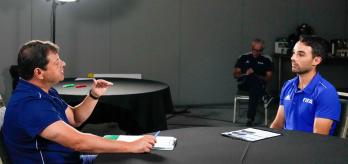The role of the Coach Educator Developer is crucial to the development of better Coach Educators who, in turn, help shape better Student-Coaches. In this session, FIFA Senior Coaching and Player Development Manager Giovani Fernandes and FIFA Technical Expert Sean Douglas play the role of Coach Educator Developer and Coach Educator. As Coach Educator, Douglas supports Student-Coach Liam Lacey through the process of planning, preparing, facilitating and evaluating.
Pre-session meeting
To begin the mentoring process, the Student-Coach and Coach Educator engage in a pre-session meeting. This meeting is observed by the Coach Educator Developer, whose role it is to give feedback to the Coach Educator. During the pre-session meeting the role of the Coach Educator Developer is to:
-
Observe and listen to the discussion between Student-Coach and Coach Educator (with a focus on the Coach Educator)
-
Take notes focusing on effective behaviour and also areas for improvement
Session observation
During the practical session, we see how the Coach Educator Developer adopts an effective position to allow for observation and active listening. The Coach Educator Developer ensures the position they adopt does not distract or interfere with the session or interactions between Coach Educator and Student-Coach. In a similar way to the pre-session discussion, the Coach Educator Developer takes appropriate notes to feedback to the Coach Educator during the post-session feedback.
Post-session feedback
The post-session feedback process is critical to supporting the development of both Student-Coaches and Coach Educators. The feedback process between Coach Educator Developer and Coach Educator is similar to the process followed by Coach Educator and Student-Coach. In both scenarios, it is crucial to create a positive learning environment where feedback, discussion and reflection is encouraged.
Coach Educator’s feedback for Student-Coach
Coach Educator Developer’s feedback for Coach Educator
Learning framework: GRIP
The Coach Educator Developer guides the Coach Educator through mentoring sessions based on the GRIP model. The Coach Educator Developer aids the Coach Educator in establishing precise goals for the Student-Coach and fosters reflections on how to ensure these goals are addressed during session. Following this, the Coach Educator Developer provides input by challenging the Coach Educator to develop a clear plan with specific strategies to ensure the identified areas for improvement are addressed in upcoming session.
As a Coach Educator Developer you should aim to:
-
Create a positive learning environment and connect with the Coach Educator;
-
Take up effective positions during all elements of the coaching session ensuring you can observe and listen without interfering;
-
Provide evidenced-based feedback;
-
Reinforce good practice; and
-
Encourage the Coach Educator to think critically in order to provide a better experience for Student-Coaches.



